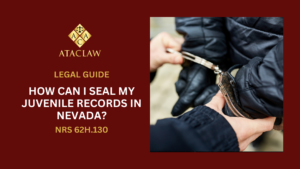As ATAC LAW, we understand the importance of ensuring a clean record for individuals who have been involved in the juvenile justice system. Having a sealed juvenile record not only provides a fresh start but also offers numerous benefits for future opportunities. In this comprehensive guide, we will address common questions regarding the sealing of juvenile records in Nevada, providing valuable information on the procedures, eligibility, and advantages of this process.

Can I get my juvenile record sealed before I turn 21?
One question many individuals have is whether they can get their juvenile record sealed before turning 21. In Nevada, the sealing of juvenile records often occurs automatically once an individual turns 21. This means that once you reach this age, your juvenile records are generally sealed without any additional steps.
However, it’s important to note that automatic sealing is not guaranteed in certain circumstances. If you have committed a serious offense or have a repeated history of offenses, your record may not be sealed automatically at age 21. In such cases, it is important to explore the possibility of sealing your record earlier through a petition to the court.
What is the procedure for sealing my juvenile record if I am under 21?
If you are under 21 and interested in sealing your juvenile record earlier, you can petition the court to do so. According to Nevada Revised Statutes (NRS) 62H.190, individuals may apply to have their juvenile records sealed before reaching the automatic sealing age of 21.
To initiate the process, you will need to file an application with the appropriate court. The application typically requires providing details about your case, including the offenses committed, dates, and other relevant information. Additionally, you will need to gather supporting documentation such as completion of any required programs, proof of rehabilitation, and character references.
After filing the application, a court hearing will be scheduled. During the hearing, a judge will evaluate various factors to determine whether your juvenile record should be sealed. These factors include the nature of the offense, your behavior since the offense, compliance with court orders, and rehabilitation efforts. The judge will consider these factors to make an informed decision about sealing your record.
It is important to note that the procedure for sealing juvenile records can vary slightly depending on the county where the offense occurred. For this reason, it is best to consult with an experienced attorney who can guide you through the specific requirements and procedures applicable to your jurisdiction.
What is the procedure for sealing my juvenile record if I am over 21?
If you are over 21 but your juvenile record has not been sealed automatically, you can still request sealing it. The process for sealing a juvenile record as an adult involves filing a petition with the district court. You will need to fill out a specific form, pay the necessary fees, and provide supporting documentation to support your request.
When evaluating your petition, the court will consider various factors, such as your age, behavior since the offense, compliance with court orders, and reasons for requesting the seal. It is crucial to provide compelling reasons for sealing your juvenile record and demonstrate that you have made positive changes since the offense.
It’s important to note that the process for sealing a juvenile record as an adult may vary from county to county in Nevada. Therefore, it is advisable to consult with an experienced attorney who can guide you through the specific requirements and procedures applicable to your jurisdiction.
Who is eligible to have their juvenile record sealed?
In Nevada, eligibility for sealing a juvenile record is determined by the nature and severity of the offense, as well as an individual’s behavior and rehabilitation efforts since the offense. Generally, individuals who have been convicted of minor offenses and have displayed positive behavior and compliance with court orders are more likely to be eligible for sealing their juvenile records.
However, individuals who have committed serious offenses or have a repeated history of offenses may have a more challenging time qualifying for record sealing. Ultimately, a judge will evaluate the individual’s entire case to determine eligibility for sealing the record.
What are the benefits of having my juvenile records sealed?
Sealing your juvenile records can provide several advantages for your future. By sealing your record, you can:
- Enhance Employment Prospects: A sealed juvenile record ensures that potential employers will not have access to your past offenses during background checks. This can significantly increase your chances of securing employment and pursuing your desired career path.
- Pursue Education and Housing Opportunities: Sealing your juvenile record can open doors to educational institutions and housing opportunities that may have been closed to individuals with a criminal record.
- Obtain Professional Licenses and Certifications: Certain professional licenses and certifications require a background check. Sealing your juvenile record can improve your chances of acquiring the necessary credentials for your desired profession.
- Access Loans and Financial Aid: A sealed record can positively impact your eligibility for loans, scholarships, and financial aid programs, allowing you to pursue higher education and achieve your goals.
- Restore Personal and Professional Reputation: Sealing your juvenile record allows you to rebuild your reputation and move forward in life, free from the stigma associated with past offenses.
Understanding the process of sealing juvenile records in Nevada is essential for anyone seeking to ensure a bright future despite past mistakes. ATAC LAW is committed to helping individuals navigate the complex legal terrain and safeguard their opportunities for personal and professional growth. By sealing your juvenile records, you can embrace new possibilities and build a better future, free from the negative effects of past offenses.
Legal References:
- NRS 62H.190: https://www.leg.state.nv.us/NRS/NRS-062H.html#NRS062HSect190
- NRS 179.245: https://www.leg.state.nv.us/NRS/NRS-179.html#NRS179Sec245
